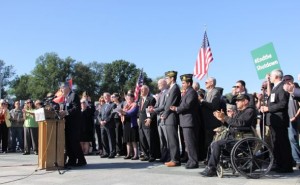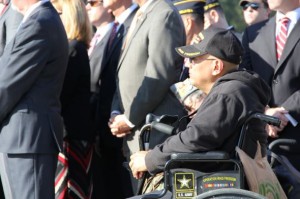WASHINGTON – Rallying in from of the shuttered World War II Memorial once again, leaders from veterans and active-duty military organizations Tuesday said the partial government shutdown is hurting people who have served the country and their families.
The Military Coalition, which represents 33 veterans and service member groups like the American Legion, called on lawmakers to come up with a budget solution. Speakers said that without a defense appropriations bill, current military operations are at risk, veterans face losing benefits, active-duty personnel going overseas are not getting housing allowances, and training for deployments and for the reserves have been canceled.

The Military Coalition gathers at the WWII Memorial Tuesday to call for an end to the government shutdown. Andrea Mayeux/Medill“
“They are being overlooked,” said retired Maj. Gen. Andrew Davis, executive director of the Reserve Officers Association of the U.S., making reservists “feel like second-class warriors. This federal government shutdown proves to them that they are actually right.”
Davis said the cancellation of weekend training for reserves hits soldiers’ pocketbooks. They are “not able to make up lost training time and income, unlike furloughed workers,” Davis said.
“It’s time to end the government shutdown now,” he said.
Retired 1st Lt. William Garcia anticipates losing disability benefits next week if the shutdown continues. In addition, funding for his vocational rehabilitation has been cut, he said.
Garcia now works for the Internal Revenue Service and said he took a hit from sequester cuts, losing thousands from his paycheck. Now with the shutdown, he is furloughed.
“There is no money coming in,” Garcia said. The Disabled American Veterans and Veterans of Foreign Wars are helping, but, Garcia said, “it’s not enough. It’s not what was there before.”

Retired 1st Lt. William Garcia worries his benefits could disappear in the next week or so if the shutdown continues. Andrea Mayeux/Medill
Garcia was injured during training for a deployment to Iraq in 2006. He suffers from post-traumatic stress disorder.
“It just got better when I was getting work… and now they took it away from me and the stress is just enormous.”
Retired Spc. Matt McDonald worries that a gap in veteran benefits to those wounded in combat will “put a lot of people out.”
“It’s not that we’re just slackers living off the government,” McDonald said. “It was the last [place] I ever thought that I’d be… When I got 30 percent (of his pay as a disability benefit) when I came home, I felt guilty.”
